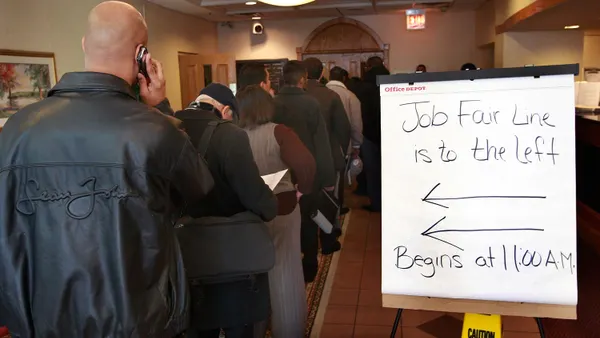In a new survey of return-to-office sentiment, 25% of C-suite and VP executives and 18% of HR professionals said they hoped for voluntary turnover with RTO policies, according to a June 6 report from BambooHR.
In a survey of 1,504 U.S. desk job employees, including 504 HR pros with a manager title or higher, 37% of managers, directors and executives said they believe their organization conducted layoffs in the last year because fewer employees quit than expected during the RTO transition.
In turn, performative tactics have emerged among workers — both on-site and remotely — to demonstrate visibility, the study found. About 42% of employees said they feel like they show up at the office solely for the purpose of being seen by managers and bosses.
While at the office, 37% of employees said they walk around the office so co-workers see them. In addition, more than a third plan meetings with other co-workers who are also in the office, and about a third show up earlier or leave later than their manager to make sure their efforts are seen.
While remote, 39% of employees said they participate in social conversations in work messaging apps to show they’re online, and 31% schedule-send emails. Notably, 64% of remote workers said they keep work messaging apps perpetually open to display a green “active” status to indicate they’re online and working, even if they’re not.
“The distrusting and performative cultures some companies are cultivating are harmful to bottom-line growth and it’s becoming more clear that leaders should take each employee’s experience into account,” Anita Grantham, head of HR at BambooHR, said in a statement.
For instance, rigid RTO policies are more likely to drive away high-performing employees, women and millennials, according to a Gartner report. The costs linked to attrition and productivity may outweigh the RTO benefits related to employee engagement, the firm noted.
RTO mandates also prompt long-term and senior leaders to leave — often to join direct competitors, according to researchers at the University of Chicago and University of Michigan. Despite different RTO policies and corporate cultures at Apple, Microsoft and SpaceX, all three companies had “nearly identical effects,” the researchers estimated.
Although RTO mandates drive away talent, 70% of companies plan to increase or maintain in-person office days in 2025, according to a Resume Builder survey. While about half of companies reported requiring employees to be in the office four or five days per week, 93% of business leaders voiced support of RTO mandates and said they believe employees should be in the office.










